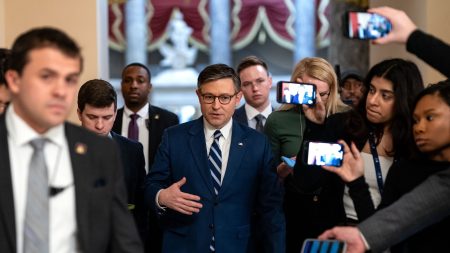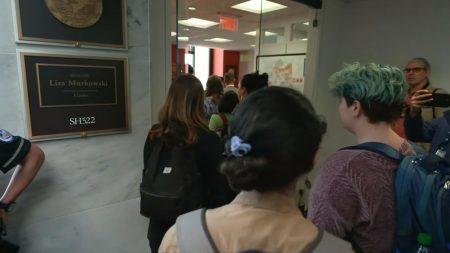A Sudden and Devastating Blow: The Impact of Mass Federal Firings
Carly Arata’s world was turned upside down when she received an email at 9 p.m. on a Thursday informing her that her position in the federal government had been terminated. The news left her in shock, screaming and crying as she struggled to Process the unexpected blow. Arata, who had been a probationary employee with the Department of Agriculture’s Natural Resources Conservation Service since September, and had previously worked as a contractor in the same role for a year, was deeply reliant on her job to support herself and her husband, who had just purchased a home in December. “I didn’t think it was real at first, so I reread it like three times, then kind of started crying because I was relying on this job,” she said. The termination has left her and her husband unsure of their future, as they now face financial uncertainty.
Arata is one of potentially more than 200,000 workers affected by the mass firings of probationary employees. Despite her extensive experience and qualifications—she holds a bachelor’s degree in environmental science and a master’s degree in ecological restoration—Arata was let go simply because she had not yet completed her first year of federal service. “We’re relying on this job and we’re qualified for this job, and yet, we’re losing it just because we’re under a year,” she lamented. The termination not only affects her personally but also the farmers she worked with in Georgia, whom she helped develop conservation plans and secure federal funding. “They were amazing and cared so much about their land, and I wanted to help them preserve that,” she said, expressing a sense of abandonment and helplessness.
Passionate Public Servants: The Human Cost of Arbitrary Firings
Arata and other terminated employees take issue with the narrative promoted by figures like Elon Musk and President Donald Trump, who have claimed that the federal government is plagued by waste and inefficiency. “Everyone that is there loves what they do, and they bust their butts to do it,” Arata said of her colleagues. “They know their jobs inside and out.” She believes the firings are misguided and will ultimately harm the very people the Trump administration claims to care about—farmers. “They say they care so much about their farmers, and they’re taking away the people that help them the most,” she said.
Arata’s role as a soil conservationist was critical, as she was the only one overseeing two counties in Georgia. Her responsibilities included helping farmers install wells and watering facilities for animals, implement cover cropping, and cross-fencing for cattle. The loss of her expertise will likely leave a significant gap in the services provided to these farmers, many of whom are already struggling due to frozen funds from the Inflation Reduction Act. “A lot of people are going to miss out on money that is vital to their operations,” she warned.
Corey Krzan Matta, another terminated employee, shares Arata’s frustration. A legal expert working on the Hanford site nuclear cleanup in Washington state for the Department of Energy, Krzan Matta described the firings as “haphazard” and “arbitrary.” He noted that while previous administrations have also sought to reduce government waste, the current approach lacks consideration for the importance of the work being done. “There’s no consideration for the mission. There’s no consideration for whether or not this position is critical,” he said.
Krzan Matta, a Navy veteran with years of legal experience, had found a job he loved at the Department of Energy. His role in cleaning up the Hanford site—a legacy of the Manhattan Project—was not only fulfilling but also deeply personal, as he grew up in the community affected by the site. “I was overjoyed to have found a job that I really fell in love with, not just for the work that I do find interesting and fulfilling, but the mission out here of cleaning up the Hanford site and supporting the community that I grew up in,” he said. The abrupt termination of his employment, without even the customary two weeks’ notice, has left him feeling betrayed.
The Fallout: Uncertainty and Overwork
The mass firings have created a ripple effect, leaving both terminated employees and their former colleagues in a state of upheaval. Krzan Matta pointed out that the sudden loss of staff is overloading an already understaffed federal workforce. “I think of my colleagues who are already overworked from an incredibly busy schedule with an understaffed team who now have to shoulder all of my work—because it doesn’t just go away because I go away,” he said. The termination emails, which immediately revoke computer access and deactivate badges, leave little room for transition or closure. “It is simply: It’s done. It’s over with. Leave,” he said.
For Arata, the future looks bleak. “I’m going to be driving food delivery or something until I can find something,















